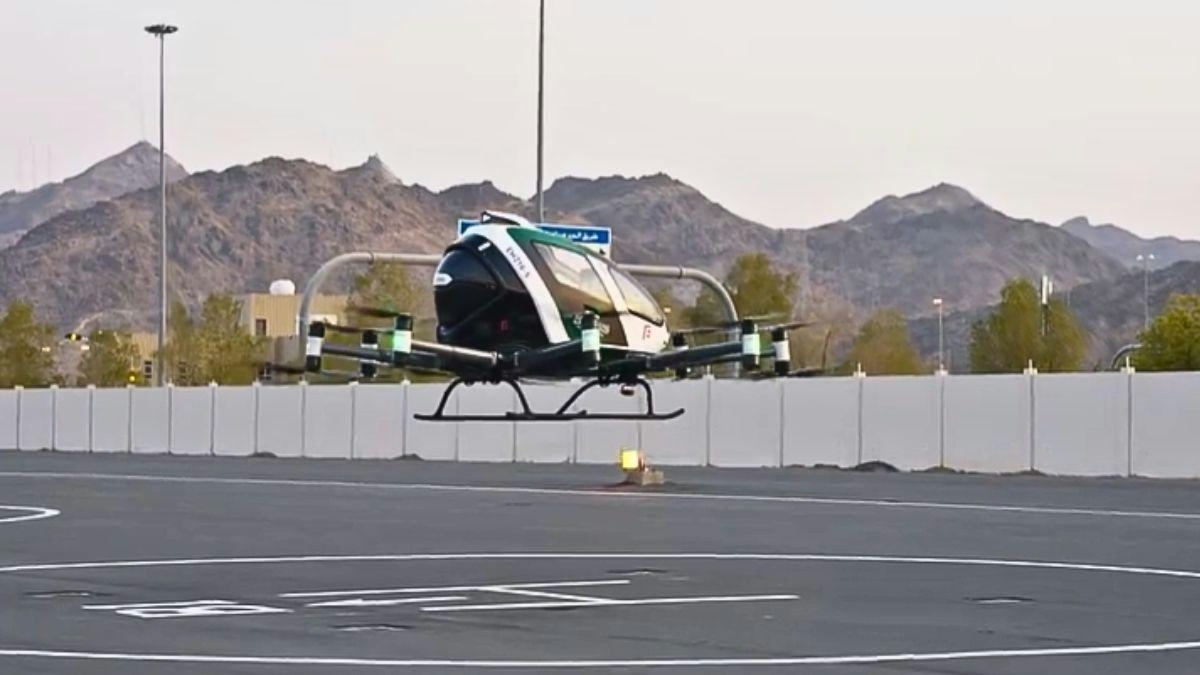AeroGenie — Votre copilote intelligent.
Tendances
Categories
Saudi Arabia Agrees to Deploy Air Taxis Across the Kingdom

Saudi Arabia to Deploy Autonomous Air Taxis Nationwide in Partnership with China’s Ehang
Saudi Arabia has formalized an agreement with Chinese drone manufacturer Ehang to introduce autonomous air taxis across the kingdom, with commercial passenger services scheduled to commence in November. This initiative, announced by Khobar-based technology firm Front End, represents a pivotal advancement in Saudi Arabia’s ambition to revolutionize its air mobility sector and establish itself as a global leader in cutting-edge aviation technologies.
Partnership and Technology Deployment
The collaboration involves Front End, Ehang, and Cluster2—the operator of 22 airports within Saudi Arabia—working together to deploy Ehang’s EH216-S, a two-seat, fully electric, pilotless air taxi. Front End’s chairman and CEO, Majid Alghaslan, confirmed that the first passenger flights will begin this November, positioning Saudi Arabia as the first country in the region to offer paid autonomous air taxi services. Alghaslan outlined plans for gradual expansion throughout 2026 and 2027, extending the service across the Cluster2 airport network and beyond to establish a comprehensive national advanced air mobility system.
The EH216-S has already secured type certification from the Civil Aviation Administration of China, underscoring its reliability following extensive testing. In addition to passenger transport, the EH216-L logistics variant will be deployed for cargo delivery, public safety missions, and government operations, broadening the scope of autonomous aerial vehicle applications within the kingdom.
Strategic Vision and Regulatory Framework
This development aligns with Saudi Arabia’s broader strategy to enhance its aviation sector, with advanced air mobility identified as a critical pillar. In August 2024, the General Authority of Civil Aviation unveiled its Advanced Air Mobility Roadmap, which delineates the necessary technologies, regulatory frameworks, and use cases to ensure safety and unlock economic potential. The roadmap anticipates multiple benefits, including reduced urban congestion, fewer traffic accidents, progress toward sustainability targets, and increased foreign direct investment. It also aims to stimulate growth in key sectors such as tourism, manufacturing, and transportation.
Front End emphasized its role not only in testing but also in certifying and operating autonomous aerial vehicles across the kingdom. According to Alghaslan, the company is laying the groundwork for a low-altitude economy supported by urban traffic management systems, thereby unlocking significant economic value and positioning Saudi Arabia at the forefront of the world’s most advanced mobility technologies.
Regional Context and Market Dynamics
Despite the promising outlook, the rollout of air taxis faces challenges including regulatory complexities, safety concerns, and the integration of new technologies into existing infrastructure. The market has responded with increased investor interest and strategic partnerships, exemplified by the recent $125 million agreement between Joby Aviation and Blade Air Mobility. Competitors are accelerating their own air taxi initiatives; for instance, Uber is advancing helicopter ride services through a partnership with Joby Aviation.
Saudi Arabia’s ambitions are reflected across the Gulf region, where cities such as Dubai and Abu Dhabi are also pursuing flying taxi projects. Archer Aviation plans to launch services in Abu Dhabi, while Dubai is collaborating with international partners to develop similar initiatives. In June 2024, Front End and Ehang successfully conducted unmanned air taxi trials in Makkah, further demonstrating the kingdom’s commitment to becoming a regional hub for autonomous mobility.
As Saudi Arabia prepares for the operational launch of air taxis, it aims to leverage autonomous aerial vehicle technology to attract global investment and enhance its economic value chains, navigating the challenges that lie ahead.

Emirates Unveils Cabin Design for New Boeing 777X

Eighteen Years On, the Airbus A380 Remains Central to a $34 Billion Airline

How a boom in luxury airline seats is slowing down jet deliveries

Navitaire Outage Attributed to Planned Maintenance

DigiYatra Debuts Outside Aviation at India AI Impact Summit

Vietnam Orders Strengthen Boeing’s Commercial Outlook

Airbus Signals Uncertainty Over Future A400M Orders

JobsOhio Awards $2 Million Grant to Hartzell Propeller for Innovation Center

Collins Aerospace Tests Sidekick Autonomy Software on YFQ-42A for U.S. Air Force CCA Program

How the Airbus A350-1000 Compares to the Boeing 777
